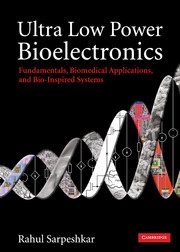Book contents
- Frontmatter
- Contents
- Acknowledgements
- Section I Foundations
- 1 The big picture
- 2 Feedback systems: fundamentals, benefits, and root-locus analysis
- 3 MOS device physics: general treatment
- 4 MOS device physics: practical treatment
- 5 MOS device physics: small-signal operation
- 6 Deep submicron effects in MOS transistors
- 7 Noise in devices
- 8 Noise in electrical and non-electrical circuits
- 9 Feedback systems
- 10 Return-ratio analysis
- Section II Low-power analog and biomedical circuits
- Section III Low-power RF and energy-harvesting circuits for biomedical systems
- Section IV Biomedical electronic systems
- Section V Principles for ultra-low-power analog and digital design
- Section VI Bio-inspired systems
- Section VII Energy sources
- Bibliography
- Index
- Epilogue
- References
7 - Noise in devices
from Section I - Foundations
Published online by Cambridge University Press: 02 December 2010
- Frontmatter
- Contents
- Acknowledgements
- Section I Foundations
- 1 The big picture
- 2 Feedback systems: fundamentals, benefits, and root-locus analysis
- 3 MOS device physics: general treatment
- 4 MOS device physics: practical treatment
- 5 MOS device physics: small-signal operation
- 6 Deep submicron effects in MOS transistors
- 7 Noise in devices
- 8 Noise in electrical and non-electrical circuits
- 9 Feedback systems
- 10 Return-ratio analysis
- Section II Low-power analog and biomedical circuits
- Section III Low-power RF and energy-harvesting circuits for biomedical systems
- Section IV Biomedical electronic systems
- Section V Principles for ultra-low-power analog and digital design
- Section VI Bio-inspired systems
- Section VII Energy sources
- Bibliography
- Index
- Epilogue
- References
Summary
But the real glory of science is that we can find a way of thinking such that the law is evident.
Richard P. FeynmanNoise ultimately limits the performance of all systems. For example, the maximum gain of an amplifier is limited to VDD/vn where VDD is the power-supply voltage and vn is the noise floor at the input of the amplifier. Gains higher than this limiting value will simply amplify noise to saturating power-supply values and leave no output dynamic range available for discerning input signals.
Since power is the product of voltage and current, low-power systems have low voltages and/or low current signal levels. Hence, they are more prone to the effects of small signals such as noise. A deep understanding of noise is essential in order to design architectures that are immune to it, in order to efficiently allocate power, area, and averaging-time resources to reduce it, and in order to exploit it. We will begin our study of noise in physical devices from a first-principles view of some of the fundamental concepts and mathematics behind it.
The mathematics of noise
We pretend that macroscopic current is the flow of a smooth continuous fluid. However, the current is actually made up of tiny microscopic discrete charged particles that flow in a semi-orderly fashion. The random disorderly portion of the charged-particle motion manifests itself in the macroscopic current as noise. Figure 7.1 reveals how macroscopic current is actually made up of tiny fluctuations around its mean value which constitute current noise.
Information
- Type
- Chapter
- Information
- Ultra Low Power BioelectronicsFundamentals, Biomedical Applications, and Bio-Inspired Systems, pp. 155 - 183Publisher: Cambridge University PressPrint publication year: 2010
